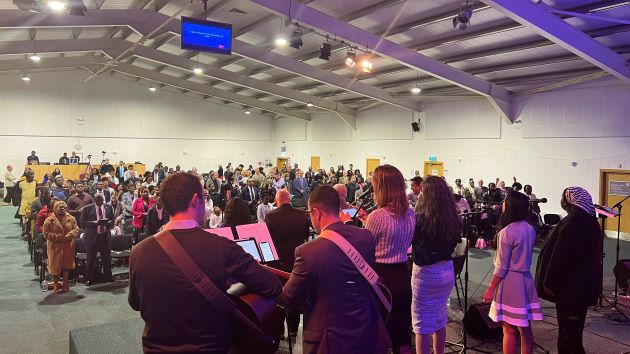God’s mission vision exists for all.

Mission can seem like a rather ambiguous word. After all, it’s used in many different ways to describe many different activities. What do you think of when you hear the word “mission”? A mission to Mars, a diplomatic mission, a military mission, or something missionaries do in a foreign land? When I think of mission, I think of God’s mission of love to all who live on earth and the people who take that special purpose as their own.
The tiny group of disappointed and scattered Adventist believers of the 1850s could not have become a worldwide church without embracing God’s mission of love and allowing His vision to draw them together in shared action to reach others. The unity found in mission vision and action still ties the Adventist Church together across differing languages, cultures, ethnicities, and nationalities, for Christianity was birthed multicultural and multilinguistic (Acts 2:7-11). Just as Acts 2 records people hearing the gospel in some 15 different languages, so today the Adventist Church is active in scores of languages and has a presence in most of the 195 nations of the earth. Full-time General Conference missionaries from about 70 home countries currently serve in 85 countries of the world. In addition, many world divisions send cross-cultural missionaries within their territories, with supporting ministries adding to the workforce. Adventist mission truly is from everywhere to everywhere.
Yet we have far to go to take the good news of Jesus’ soon return to every person on earth. About 75 percent of Adventists live in the Americas and sub-Saharan Africa, while more than 75 percent of the world’s population live in the Middle East/ North Africa, Europe, and Asia, where fewer than 25 percent of Adventists live.¹ Jesus’ last words on earth instructed His followers to be His witnesses “in Jerusalem [with one’s own people], and in all Judea and Samaria [with near people groups], and to the ends of the earth [with distant people groups]” (Acts 1:8). That mission mandate is still in effect for each of us today. Our mission starts at home, in our families, to our neighbors, and often within our own linguistic group. But Jesus’ last words remind us that we cannot stop there. We also have a responsibility to be His witnesses in every culture and language, to “the ends of the earth.”
Today the mass movement of peoples across nations and continents has brought cross-cultural mission to our very doors. Every city in every country has ethnic restaurants and neighborhoods, often with growing refugee and immigrant groups who also need to hear God’s end-time message. Too often such groups are invisible, forgotten, or thought to be “too hard” to reach. Yet if we are to fulfill God’s mission vision of bringing people everywhere into a relationship with Him, we need to find ways of sharing His love with every one of them. We must be willing to embrace our diversity, use every gift and talent, try new ideas and methods, and take united action.
Often the parts of the world where the church has not grown quickly have cultures and religions that are very different from the parts of the world where the church is strong. Winning to Christ adherents from another world religion requires a deep understanding of their unique culture and worldview. That usually means working in a very different way than we would with a Christian from another denomination. Different ways of witnessing are also needed where secularism has created a disinterest in religion. We cannot expect results unless the gospel has truly transformed us, and we authentically invest in the lives of those we seek to reach. In mission, as in many other areas of life, seeing is believing. Thus, sharing the gospel must be done with sensitivity, creativity, and integrity because “a loving, lovable Christian is the most powerful argument in favor of the truth.”²
Joining in God’s mission has the power to draw His church together across cultural, linguistic, and ethnic divides in witness to all people from every background, nationality, and religion. When we have experienced God’s mission of love in our own lives, we want to share His love with all those we meet. No matter who we are, or what our circumstances, God has a mission for each of us, and it’s not at all ambiguous.
¹ Gordon Doss, Introduction to Adventist Mission (Berrien Springs, Mich.: Seventh-day Adventist Theological Seminary, 2018), p. 280, You can order the book on www.amazon.com.
² Ellen G. White, Manuscript Releases (Silver Spring, Md.: Ellen G. White Estate, 1990), vol. 9, p. 129.








